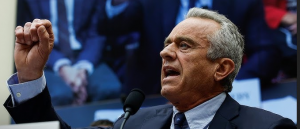As President-elect Donald Trump nominates Kash Patel to lead the FBI, critics voice apprehension regarding his qualifications and intentions, fearing that he may prioritize political loyalty over the traditional apolitical nature of the agency.
Scrutiny Grows Over Trump's FBI Director Nominee Kash Patel

Scrutiny Grows Over Trump's FBI Director Nominee Kash Patel
Concerns are mounting about the qualifications and agenda of Kash Patel, Donald Trump's nominee for FBI Director, raising alarm over potential partisan shifts within the agency.
Concerns are mounting over Kash Patel, President-elect Donald Trump’s choice to helm the FBI, as critics cite his limited qualifications and a potential agenda aimed at dismantling the bureau's traditional nonpartisan structure. Critics fear that Patel, known for his loyalty to Trump during the previous administration, is interested in transforming the FBI into a vehicle for political retribution rather than an impartial law enforcement body.
Former FBI agent Jeff Lanza stated that Patel’s expressed desire to "decimate the agency" could severely impact the morale of the approximately 37,000 employees under an FBI director who traditionally works to uphold principles of justice and professionalism. Additionally, experts underline that Patel's scant management experience may hinder his ability to lead an organization of such scope and responsibility. Gregory Brower, a former assistant director at the FBI, emphasized that effective leadership requires expert judgment, stamina, and a strong ethical grounding—qualities he doubts Patel possesses based on his background.
In announcing Patel’s nomination, Trump lauded him as "a brilliant lawyer, investigator, and 'America First' fighter," noting his experience from a federal public defender to key roles in national security and defense. Yet, critics assert that Patel’s trajectory diverges significantly from that of typical FBI directors, many of whom have built extensive careers within the agency. Former Attorney General Bill Barr recounted strong opposition to Patel’s prior candidacy for a senior FBI position, indicating a lack of respect from agency personnel for someone with limited field experience.
Patel's controversial perspectives extend beyond agency management; he has threatened to pursue investigations against political opponents and media figures if Trump returns to the presidency. In a podcast, he stated intentions to prosecute those he accuses of lying about election integrity, warning of serious consequences for political adversaries. This stance has raised alarms about his commitment to the ethical and impartial functions expected of the FBI.
Despite some support for Patel’s nomination from within Trump’s circle, skepticism persists among lawmakers. Senator Mike Rounds, a Republican, expressed uncertainty over Patel’s confirmation, highlighting the Senate's role in the evaluation process. Meanwhile, Senate Judiciary Committee Chairman Dick Durbin has openly called for the nomination to be blocked, criticizing it as an attempt to weaponize the FBI for partisan objectives.
The upcoming Senate decision regarding Patel's nomination will be pivotal, as the dynamics within the agency and its future operations hang in the balance, with calls from various quarters urging careful scrutiny of a nominee whose ideologies could reshape the federal law enforcement landscape.




















